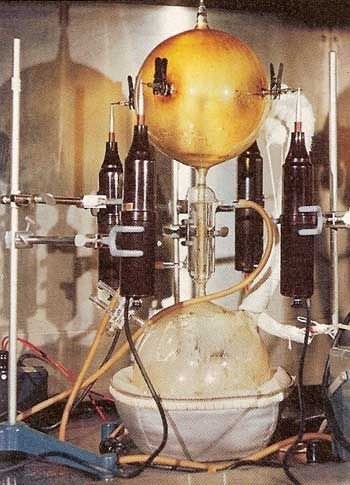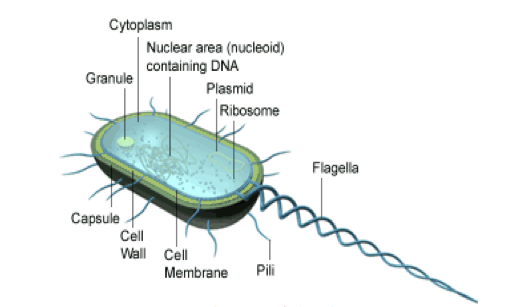The meaning of life and the purpose and origins of mankind has continued to be an area of great ambiguity and a never-ending source of contemplation and controversy for the human race.
So, how did life of Earth actually begin? If you take a look in most high school and college textbooks they will usually quote the Urey-Miller experiment (1953) and say something like this:
When Earth was forming it was a barren and lifeless mix of chemicals, basic molecules, and elements, which gave way to the formation of a land base and oceans. There were also purportedly weather patterns that would be considered to be very extreme compared to contemporary weather patterns across our globe.
We know by analysing organisms that they are composed of molecules such as nucleic acids, amino acids and sugars.

Apparatus similar to that used for the Urey-Miller Experiment.
Scientists theorise that these building blocks of life were formed by lightning strikes that combined individual elements to form molecules and indeed this has been proved in the laboratory. Experiments show that when the elements of Carbon, Nitrogen, Oxygen and Hydrogen are added to a closed system and then subjected to electrical sparking then these elements can combine to form amino acids which are one of the key building blocks to life. Hence this is how life on earth first got ‘kick started’.

The ‘primordial’ conditions thought to exist billions of years ago on Earth.
Lets take a look at this in a little more detail. There are 20 amino acids found in the physical make up of biological organisms. These are composed of approximately 15- 40 atoms. They are very basic and relatively tiny molecules. I have no problem with the fact that these can be created in laboratory conditions as described in the Urey-Miller experiment.
Take a look at the most basic known form of life on our planet- bacteria. They are composed of a cell membrane, cell capsule, numerous enzymes and complex organelles (like organs in a human or animal) such as ribosomes, Golgi apparatus and mitochondria. They also contain a nucleus, which has DNA – the genetic blueprint that contains the programming that makes the bacteria what it is. While bacteria (prokaryotic cells) are considered to be more basic that eukaryotic cells of plants or animals, they are still amazingly structured and very complex.

All of our mainstream college and high school text books will tell us that life is an accident- caused be the random collision of atoms to form basic molecules, basic molecules to collide to form complex molecules and complex molecules to collide to eventually form the basis for life.
The question to ask here is how does one go from a soup of basic molecules such as amino acids, composed of few atoms to form a complex organism composed of many many trillions of atoms which are grouped together to form complex molecules (such as DNA which is composed of billions of atoms – all arranged in a structured order) and organelles which have very specific structure and function with the ability of hereditary- the ability replicate itself and make copies of itself with all of the physical characteristics of the original cell?
This is like gathering all of the components of a house- wood, nails, bricks, roofing, mortar, wiring and the like and throwing it out of an aeroplane at high altitude and expecting them to all land in formation to form a finished house. Even trillions of attempts would never see this happen.
There is a very big knowledge gap between the information our text books give regarding the formation of the ‘basic building blocks of life’ and how those building blocks actually bonded together complex and functional cells complete with a DNA blue print and the ability of self replication, for the propagation of this type of organism for generations to come.
Indeed modern day scientists have found no plausible explanation of how this large ‘evolutionary gap’ (as Darwinism would say) was breached by the random collision of molecules.